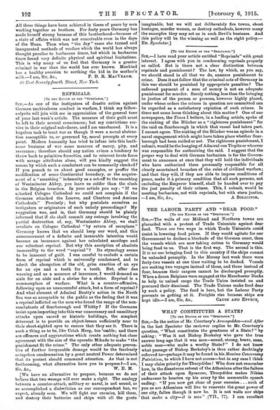[To me Roams or me "Srecrame."]
SIR,—I have read your article entitled "Reprisals" with great interest. I agree with you in condemning reprisals properly so called. But is there not a clear distinction between reprisals and punishment P The law, by which, as you say, we should stand in all that we do, annexes punishinent to crime. Does it not follow that the criminal acts of Germany in this war should be punished by appropriate penalties ? The enforced payment of a sum of money is not an adequate punishment for murder. Surely nothing less than the bringing to justice of the person or persons, however highly placed, under whose orders the crimes in question are committed can be regarded as a satisfactory expiation of such crimes. Is there not some loose thinking about this matter ? One of our newspapers, the Times I believe, in a leading article, spoke of the sinking of the Blucher as a "righteous punishment" for the raid on Scarborough in which that vessel bad taken part. I cannot agree. The sinking of the Bracher was an episode in a naval engagement which might have taken place whether Scar- borough had been raided or not. The righteous punishment, I submit, would be the hanging of Admiral von Tirpitz or whoever was responsible for authorizing the raid. I suggest that the proper way to deal with German barbarism is for the Govern- ment to announce at once that they will bold the individual% who have authorized them personally responsible for all clearly ascertained breaches of the rules of civilized warfare; and that they will, if they are able to impose conditions of peace, make it a primary condition that all such persons, not excluding the Emperor himself, shall he banded over to pay the just penalty of their crimes. This, I submit, would be meeting barbarism, not with reprisals, but with stern justice.






































 Previous page
Previous page